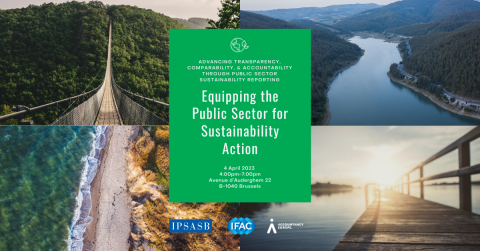IPSASB Issues Package of Revenue and Transfer Expense-Related Pronouncements
The International Public Sector Accounting Standards Board® (IPSASB®), developer of IPSAS®, international accrual-based accounting standards for use by governments and other public sector entities around the world, has issued an integrated package of revenue and transfer expenses pronouncements comprising:
- Updated Conceptual Framework: Chapter 5, Elements in Financial Statements;
- International Public Sector Accounting Standard® (IPSAS®) 47, Revenue; and
- IPSAS 48, Transfer Expenses.
The three pronouncements update and simplify existing principles, while filling gaps in the IPSAS literature, resulting in more consistent guidance for IPSAS users and better support for implementation globally. Informed by stakeholder feedback and refinement over the course of several years, the pronouncements introduce:
- A single up-to-date source of guidance applicable to all revenue transactions across the public sector; and
- A new straightforward accounting model for the recognition and measurement of transfer expenses in the public sector.
“These pronouncements address a significant proportion of transactions for all public sector entities, and their publication is a major milestone in public sector accounting,” said Ian Carruthers, IPSASB Chair. “By providing a robust principle-based approach to accounting for revenue and transfer expense transactions, these pronouncements will help increase the transparency and accountability of public sector transactions around the world.”
The updates to Chapter 5 of the Conceptual Framework revise the definitions of an asset and a liability and add new guidance on the transfer of resources, unit of account, and binding arrangements that are equally unperformed. These changes provide a strong foundation for the guidance in the new standards.
IPSAS 47 replaces IPSAS 9, Revenue from Exchange Transactions and IPSAS 11, Construction Contracts, and IPSAS 23, Revenue from Non-Exchange Transactions (Taxes and Transfers) with two accounting models for the recognition and measurement of public sector revenue transactions, based on the existence of a binding arrangement. The new IPSAS is aligned with IFRS 15, Revenue from Contracts with Customers while broadening its applicability across the public sector. Additional guidance is included to help entities apply the accounting principles to public sector-specific transactions, such as capital transfers and compelled transactions.
IPSAS 48 introduces guidance for transfer expenses, where a transfer provider provides resources to another entity without receiving anything directly in return, which is common situation in the public sector globally. The accounting for transfer expenses is driven by whether the transaction results in an enforceable right to have the transfer recipient satisfy their obligations. To operationalize this principle, IPSAS 48 presents two accounting models based on the existence or not of a binding arrangement.
The effective date for both IPSAS 47 and IPSAS 48 is January 1, 2026, with earlier application permitted. Updates to the Conceptual Framework are effective when published.
How to Access
To access the Conceptual Framework Update: Chapter 5, Elements in Financial Statements, IPSAS 47, Revenue, and IPSAS 48, Transfer Expenses, their summary At-a-Glance documents, and webcasts, visit the IPSASB website. The IPSASB encourages IFAC members, associates, and Network Partners to promote the availability of these pronouncements to their members and employees.
About the IPSASB
The International Public Sector Accounting Standards Board (IPSASB) works to strengthen public financial management globally through developing and maintaining accrual-based International Public Sector Accounting Standards® (IPSAS®) and other high-quality financial reporting guidance for use by governments and other public sector entities. It also raises awareness of IPSAS and the benefits of accrual adoption. The Board receives support from the Asian Development Bank, the Chartered Professional Accountants of Canada, the New Zealand External Reporting Board, and the governments of Canada and New Zealand. The structures and processes that support the operations of the IPSASB are facilitated by the International Federation of Accountants (IFAC). For copyright, trademark, and permissions information, please go to permissions or contact permissions@ifac.org.
About the Public Interest Committee
The governance and standard-setting activities of the IPSASB are overseen by the Public Interest Committee (PIC), to ensure that they follow due process and reflect the public interest. The PIC is comprised of individuals with expertise in public sector or financial reporting, and professional engagement in organizations that have an interest in promoting high-quality and internationally comparable financial information.
Updated Conceptual Framework Chapter is effective immediately. IPSAS 47 and IPSAS 48 have an effective date of January 1, 2026. Earlier application is permitted.

